BMGT.8012: Enhancing Cultural Intelligence at Prince's Gate Hotel
VerifiedAdded on 2023/06/11
|10
|1880
|290
Report
AI Summary
This report assesses the need for cultural intelligence (CQ) training at Prince's Gate Hotel, a New Zealand-based hospitality establishment catering to a multicultural clientele. The justification for the CQ training workshop stems from observed workplace conflicts and the necessity for cultural sensitivity among employees. The report outlines the objectives of the training, including reducing cultural shock and fostering culturally safe practices. It reviews literature on CQ, its benefits in managing conflicts, and the importance of the 4CQ factor model (metacognitive, cognitive, motivational, and behavioral CQ). The report also highlights the potential for cultural blunders and the necessity of developing leadership competency to mitigate uncertainty and misunderstandings. The training aims to equip employees with cross-cultural skills such as relational skills, adaptability, empathy, and perceptual acuity, ultimately enhancing customer satisfaction and teamwork.
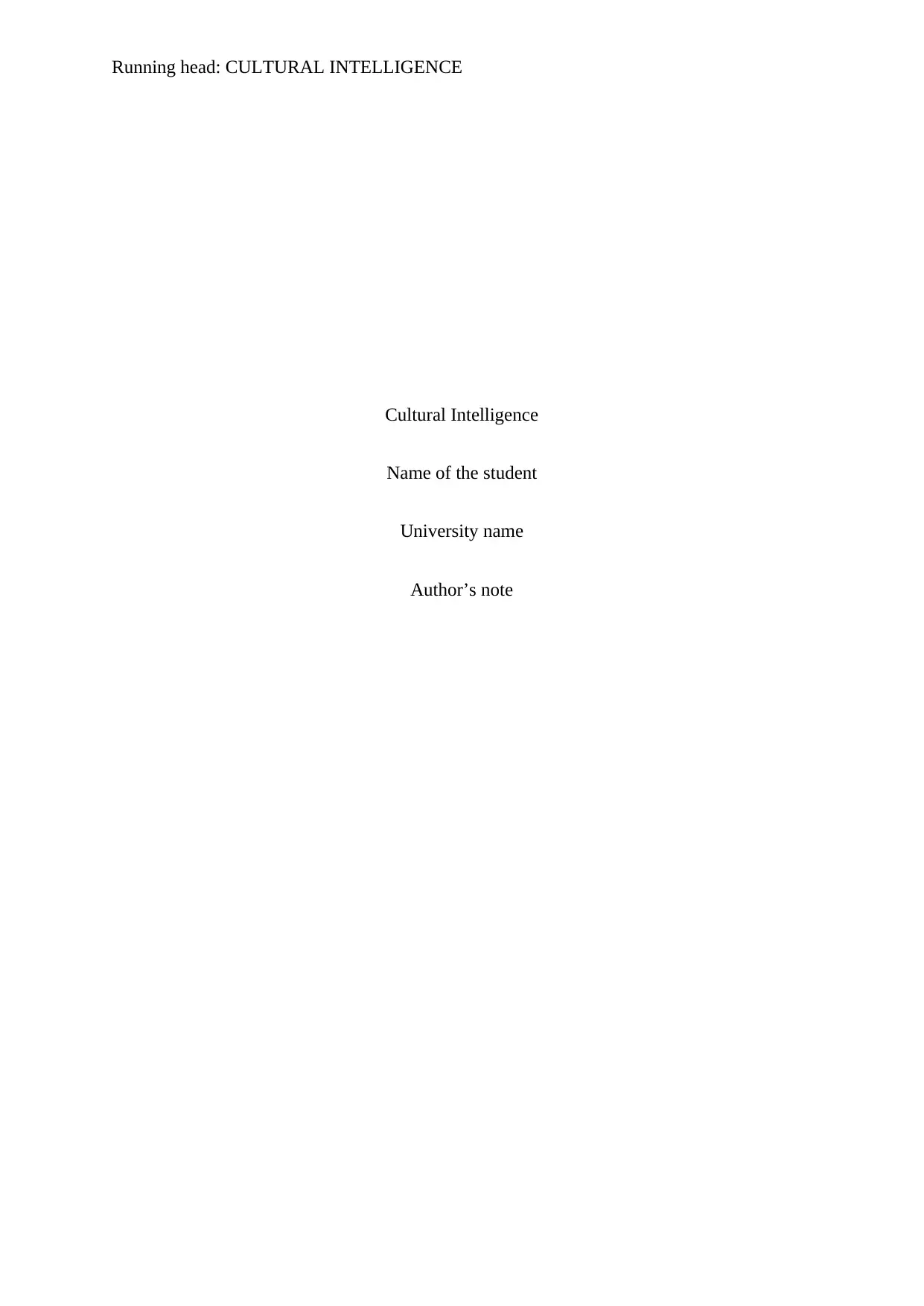
Running head: CULTURAL INTELLIGENCE
Cultural Intelligence
Name of the student
University name
Author’s note
Cultural Intelligence
Name of the student
University name
Author’s note
Paraphrase This Document
Need a fresh take? Get an instant paraphrase of this document with our AI Paraphraser
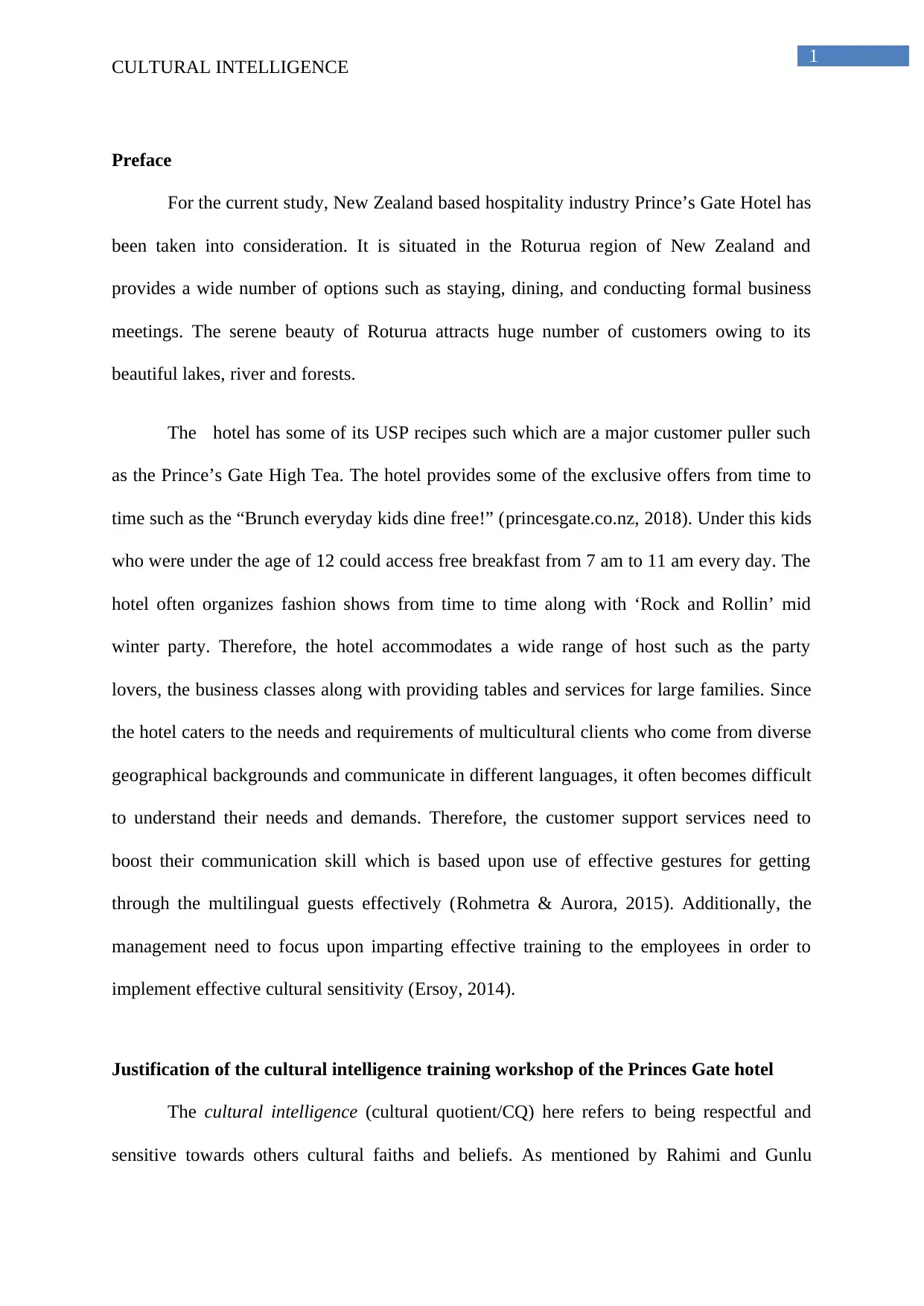
1
CULTURAL INTELLIGENCE
Preface
For the current study, New Zealand based hospitality industry Prince’s Gate Hotel has
been taken into consideration. It is situated in the Roturua region of New Zealand and
provides a wide number of options such as staying, dining, and conducting formal business
meetings. The serene beauty of Roturua attracts huge number of customers owing to its
beautiful lakes, river and forests.
The hotel has some of its USP recipes such which are a major customer puller such
as the Prince’s Gate High Tea. The hotel provides some of the exclusive offers from time to
time such as the “Brunch everyday kids dine free!” (princesgate.co.nz, 2018). Under this kids
who were under the age of 12 could access free breakfast from 7 am to 11 am every day. The
hotel often organizes fashion shows from time to time along with ‘Rock and Rollin’ mid
winter party. Therefore, the hotel accommodates a wide range of host such as the party
lovers, the business classes along with providing tables and services for large families. Since
the hotel caters to the needs and requirements of multicultural clients who come from diverse
geographical backgrounds and communicate in different languages, it often becomes difficult
to understand their needs and demands. Therefore, the customer support services need to
boost their communication skill which is based upon use of effective gestures for getting
through the multilingual guests effectively (Rohmetra & Aurora, 2015). Additionally, the
management need to focus upon imparting effective training to the employees in order to
implement effective cultural sensitivity (Ersoy, 2014).
Justification of the cultural intelligence training workshop of the Princes Gate hotel
The cultural intelligence (cultural quotient/CQ) here refers to being respectful and
sensitive towards others cultural faiths and beliefs. As mentioned by Rahimi and Gunlu
CULTURAL INTELLIGENCE
Preface
For the current study, New Zealand based hospitality industry Prince’s Gate Hotel has
been taken into consideration. It is situated in the Roturua region of New Zealand and
provides a wide number of options such as staying, dining, and conducting formal business
meetings. The serene beauty of Roturua attracts huge number of customers owing to its
beautiful lakes, river and forests.
The hotel has some of its USP recipes such which are a major customer puller such
as the Prince’s Gate High Tea. The hotel provides some of the exclusive offers from time to
time such as the “Brunch everyday kids dine free!” (princesgate.co.nz, 2018). Under this kids
who were under the age of 12 could access free breakfast from 7 am to 11 am every day. The
hotel often organizes fashion shows from time to time along with ‘Rock and Rollin’ mid
winter party. Therefore, the hotel accommodates a wide range of host such as the party
lovers, the business classes along with providing tables and services for large families. Since
the hotel caters to the needs and requirements of multicultural clients who come from diverse
geographical backgrounds and communicate in different languages, it often becomes difficult
to understand their needs and demands. Therefore, the customer support services need to
boost their communication skill which is based upon use of effective gestures for getting
through the multilingual guests effectively (Rohmetra & Aurora, 2015). Additionally, the
management need to focus upon imparting effective training to the employees in order to
implement effective cultural sensitivity (Ersoy, 2014).
Justification of the cultural intelligence training workshop of the Princes Gate hotel
The cultural intelligence (cultural quotient/CQ) here refers to being respectful and
sensitive towards others cultural faiths and beliefs. As mentioned by Rahimi and Gunlu
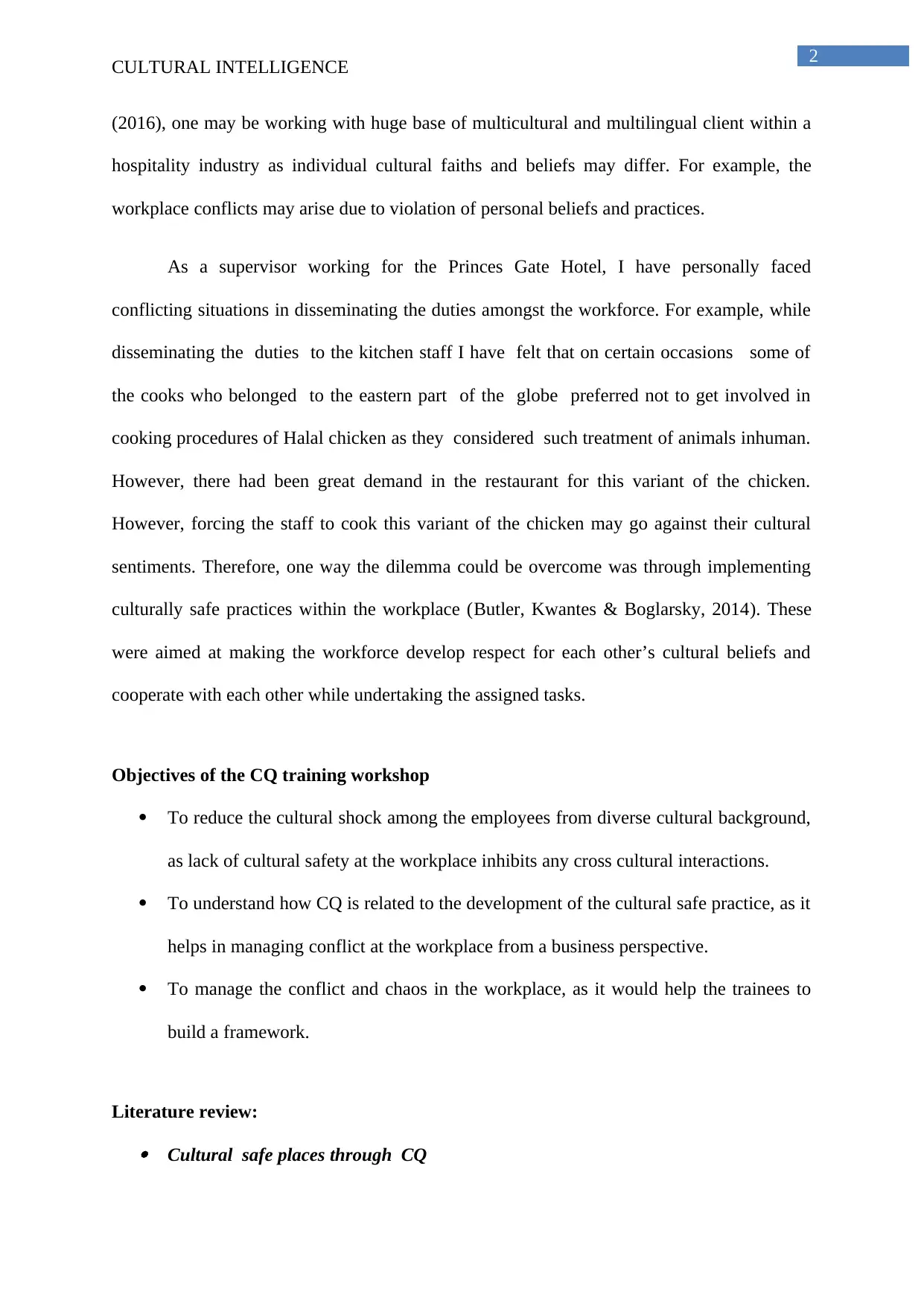
2
CULTURAL INTELLIGENCE
(2016), one may be working with huge base of multicultural and multilingual client within a
hospitality industry as individual cultural faiths and beliefs may differ. For example, the
workplace conflicts may arise due to violation of personal beliefs and practices.
As a supervisor working for the Princes Gate Hotel, I have personally faced
conflicting situations in disseminating the duties amongst the workforce. For example, while
disseminating the duties to the kitchen staff I have felt that on certain occasions some of
the cooks who belonged to the eastern part of the globe preferred not to get involved in
cooking procedures of Halal chicken as they considered such treatment of animals inhuman.
However, there had been great demand in the restaurant for this variant of the chicken.
However, forcing the staff to cook this variant of the chicken may go against their cultural
sentiments. Therefore, one way the dilemma could be overcome was through implementing
culturally safe practices within the workplace (Butler, Kwantes & Boglarsky, 2014). These
were aimed at making the workforce develop respect for each other’s cultural beliefs and
cooperate with each other while undertaking the assigned tasks.
Objectives of the CQ training workshop
To reduce the cultural shock among the employees from diverse cultural background,
as lack of cultural safety at the workplace inhibits any cross cultural interactions.
To understand how CQ is related to the development of the cultural safe practice, as it
helps in managing conflict at the workplace from a business perspective.
To manage the conflict and chaos in the workplace, as it would help the trainees to
build a framework.
Literature review: Cultural safe places through CQ
CULTURAL INTELLIGENCE
(2016), one may be working with huge base of multicultural and multilingual client within a
hospitality industry as individual cultural faiths and beliefs may differ. For example, the
workplace conflicts may arise due to violation of personal beliefs and practices.
As a supervisor working for the Princes Gate Hotel, I have personally faced
conflicting situations in disseminating the duties amongst the workforce. For example, while
disseminating the duties to the kitchen staff I have felt that on certain occasions some of
the cooks who belonged to the eastern part of the globe preferred not to get involved in
cooking procedures of Halal chicken as they considered such treatment of animals inhuman.
However, there had been great demand in the restaurant for this variant of the chicken.
However, forcing the staff to cook this variant of the chicken may go against their cultural
sentiments. Therefore, one way the dilemma could be overcome was through implementing
culturally safe practices within the workplace (Butler, Kwantes & Boglarsky, 2014). These
were aimed at making the workforce develop respect for each other’s cultural beliefs and
cooperate with each other while undertaking the assigned tasks.
Objectives of the CQ training workshop
To reduce the cultural shock among the employees from diverse cultural background,
as lack of cultural safety at the workplace inhibits any cross cultural interactions.
To understand how CQ is related to the development of the cultural safe practice, as it
helps in managing conflict at the workplace from a business perspective.
To manage the conflict and chaos in the workplace, as it would help the trainees to
build a framework.
Literature review: Cultural safe places through CQ
⊘ This is a preview!⊘
Do you want full access?
Subscribe today to unlock all pages.

Trusted by 1+ million students worldwide
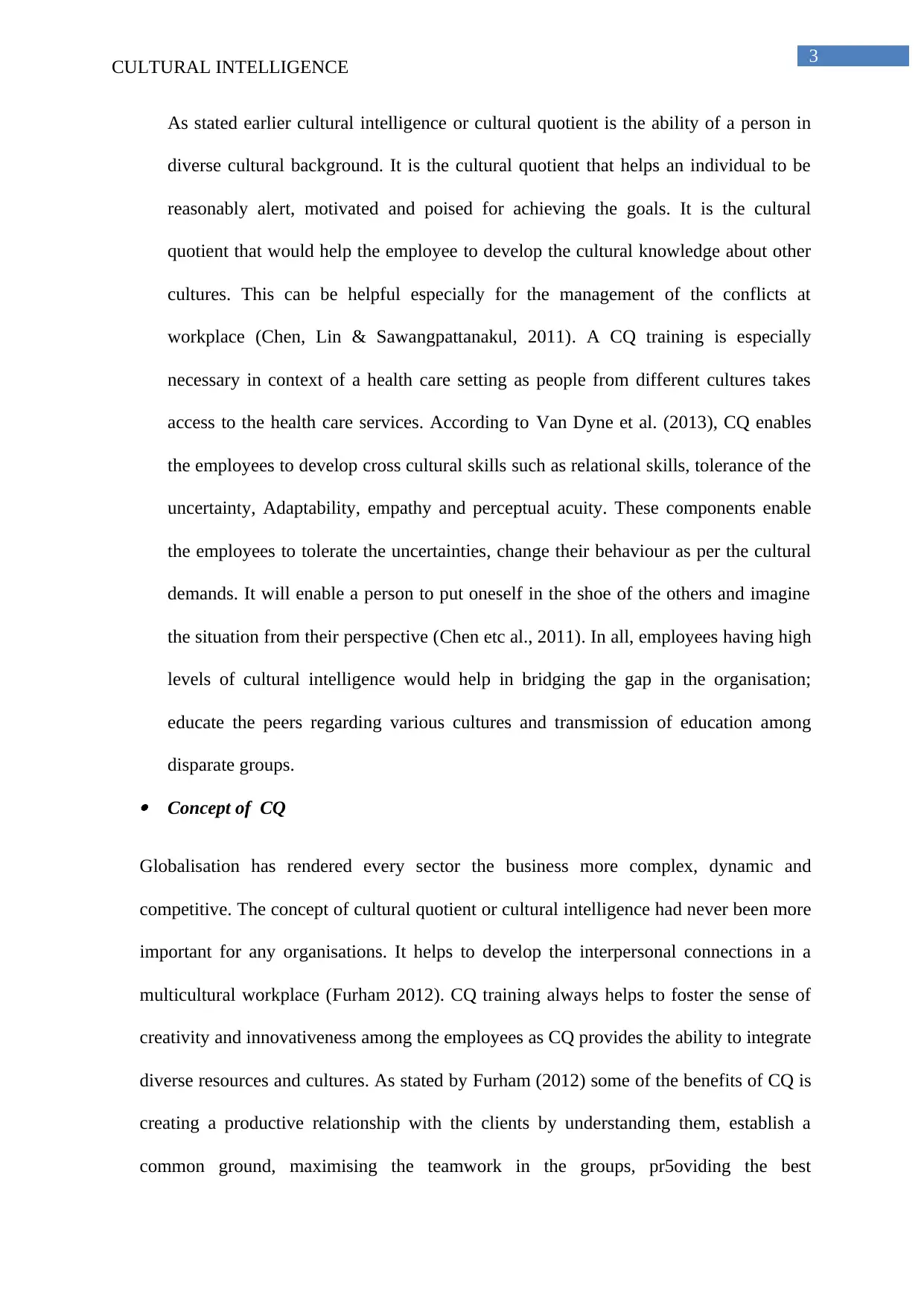
3
CULTURAL INTELLIGENCE
As stated earlier cultural intelligence or cultural quotient is the ability of a person in
diverse cultural background. It is the cultural quotient that helps an individual to be
reasonably alert, motivated and poised for achieving the goals. It is the cultural
quotient that would help the employee to develop the cultural knowledge about other
cultures. This can be helpful especially for the management of the conflicts at
workplace (Chen, Lin & Sawangpattanakul, 2011). A CQ training is especially
necessary in context of a health care setting as people from different cultures takes
access to the health care services. According to Van Dyne et al. (2013), CQ enables
the employees to develop cross cultural skills such as relational skills, tolerance of the
uncertainty, Adaptability, empathy and perceptual acuity. These components enable
the employees to tolerate the uncertainties, change their behaviour as per the cultural
demands. It will enable a person to put oneself in the shoe of the others and imagine
the situation from their perspective (Chen etc al., 2011). In all, employees having high
levels of cultural intelligence would help in bridging the gap in the organisation;
educate the peers regarding various cultures and transmission of education among
disparate groups. Concept of CQ
Globalisation has rendered every sector the business more complex, dynamic and
competitive. The concept of cultural quotient or cultural intelligence had never been more
important for any organisations. It helps to develop the interpersonal connections in a
multicultural workplace (Furham 2012). CQ training always helps to foster the sense of
creativity and innovativeness among the employees as CQ provides the ability to integrate
diverse resources and cultures. As stated by Furham (2012) some of the benefits of CQ is
creating a productive relationship with the clients by understanding them, establish a
common ground, maximising the teamwork in the groups, pr5oviding the best
CULTURAL INTELLIGENCE
As stated earlier cultural intelligence or cultural quotient is the ability of a person in
diverse cultural background. It is the cultural quotient that helps an individual to be
reasonably alert, motivated and poised for achieving the goals. It is the cultural
quotient that would help the employee to develop the cultural knowledge about other
cultures. This can be helpful especially for the management of the conflicts at
workplace (Chen, Lin & Sawangpattanakul, 2011). A CQ training is especially
necessary in context of a health care setting as people from different cultures takes
access to the health care services. According to Van Dyne et al. (2013), CQ enables
the employees to develop cross cultural skills such as relational skills, tolerance of the
uncertainty, Adaptability, empathy and perceptual acuity. These components enable
the employees to tolerate the uncertainties, change their behaviour as per the cultural
demands. It will enable a person to put oneself in the shoe of the others and imagine
the situation from their perspective (Chen etc al., 2011). In all, employees having high
levels of cultural intelligence would help in bridging the gap in the organisation;
educate the peers regarding various cultures and transmission of education among
disparate groups. Concept of CQ
Globalisation has rendered every sector the business more complex, dynamic and
competitive. The concept of cultural quotient or cultural intelligence had never been more
important for any organisations. It helps to develop the interpersonal connections in a
multicultural workplace (Furham 2012). CQ training always helps to foster the sense of
creativity and innovativeness among the employees as CQ provides the ability to integrate
diverse resources and cultures. As stated by Furham (2012) some of the benefits of CQ is
creating a productive relationship with the clients by understanding them, establish a
common ground, maximising the teamwork in the groups, pr5oviding the best
Paraphrase This Document
Need a fresh take? Get an instant paraphrase of this document with our AI Paraphraser
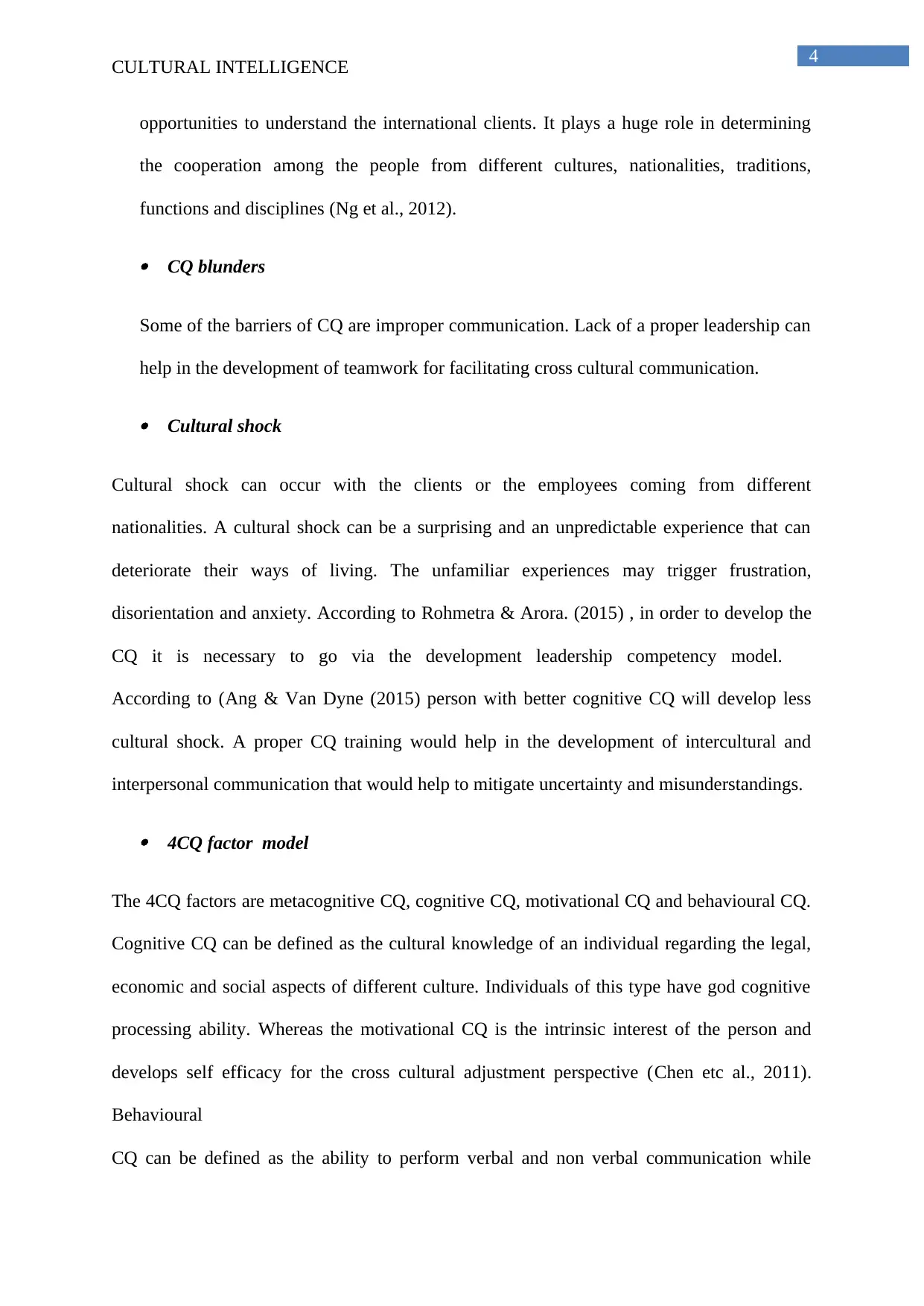
4
CULTURAL INTELLIGENCE
opportunities to understand the international clients. It plays a huge role in determining
the cooperation among the people from different cultures, nationalities, traditions,
functions and disciplines (Ng et al., 2012).
CQ blunders
Some of the barriers of CQ are improper communication. Lack of a proper leadership can
help in the development of teamwork for facilitating cross cultural communication.
Cultural shock
Cultural shock can occur with the clients or the employees coming from different
nationalities. A cultural shock can be a surprising and an unpredictable experience that can
deteriorate their ways of living. The unfamiliar experiences may trigger frustration,
disorientation and anxiety. According to Rohmetra & Arora. (2015) , in order to develop the
CQ it is necessary to go via the development leadership competency model.
According to (Ang & Van Dyne (2015) person with better cognitive CQ will develop less
cultural shock. A proper CQ training would help in the development of intercultural and
interpersonal communication that would help to mitigate uncertainty and misunderstandings.
4CQ factor model
The 4CQ factors are metacognitive CQ, cognitive CQ, motivational CQ and behavioural CQ.
Cognitive CQ can be defined as the cultural knowledge of an individual regarding the legal,
economic and social aspects of different culture. Individuals of this type have god cognitive
processing ability. Whereas the motivational CQ is the intrinsic interest of the person and
develops self efficacy for the cross cultural adjustment perspective (Chen etc al., 2011).
Behavioural
CQ can be defined as the ability to perform verbal and non verbal communication while
CULTURAL INTELLIGENCE
opportunities to understand the international clients. It plays a huge role in determining
the cooperation among the people from different cultures, nationalities, traditions,
functions and disciplines (Ng et al., 2012).
CQ blunders
Some of the barriers of CQ are improper communication. Lack of a proper leadership can
help in the development of teamwork for facilitating cross cultural communication.
Cultural shock
Cultural shock can occur with the clients or the employees coming from different
nationalities. A cultural shock can be a surprising and an unpredictable experience that can
deteriorate their ways of living. The unfamiliar experiences may trigger frustration,
disorientation and anxiety. According to Rohmetra & Arora. (2015) , in order to develop the
CQ it is necessary to go via the development leadership competency model.
According to (Ang & Van Dyne (2015) person with better cognitive CQ will develop less
cultural shock. A proper CQ training would help in the development of intercultural and
interpersonal communication that would help to mitigate uncertainty and misunderstandings.
4CQ factor model
The 4CQ factors are metacognitive CQ, cognitive CQ, motivational CQ and behavioural CQ.
Cognitive CQ can be defined as the cultural knowledge of an individual regarding the legal,
economic and social aspects of different culture. Individuals of this type have god cognitive
processing ability. Whereas the motivational CQ is the intrinsic interest of the person and
develops self efficacy for the cross cultural adjustment perspective (Chen etc al., 2011).
Behavioural
CQ can be defined as the ability to perform verbal and non verbal communication while
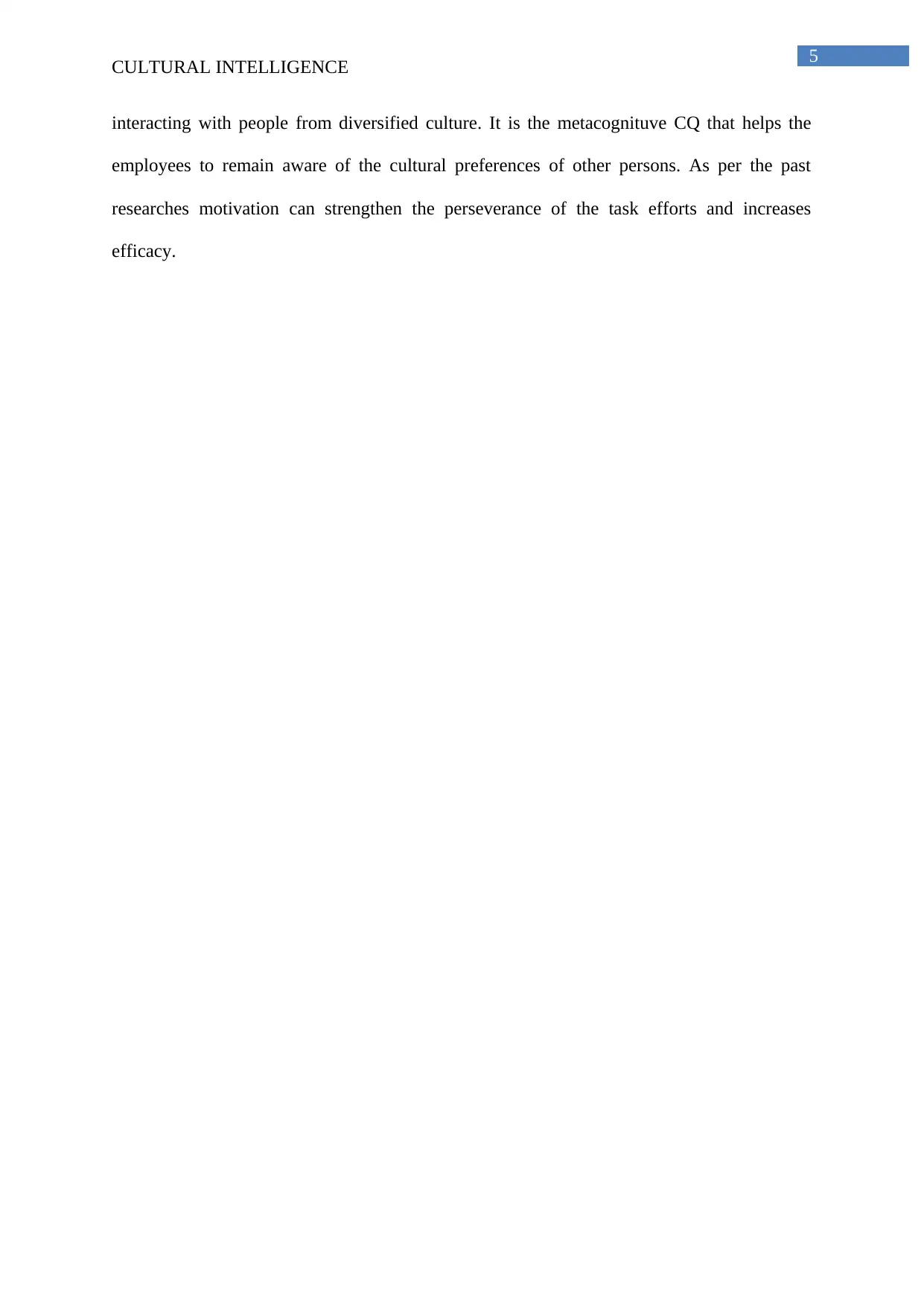
5
CULTURAL INTELLIGENCE
interacting with people from diversified culture. It is the metacognituve CQ that helps the
employees to remain aware of the cultural preferences of other persons. As per the past
researches motivation can strengthen the perseverance of the task efforts and increases
efficacy.
CULTURAL INTELLIGENCE
interacting with people from diversified culture. It is the metacognituve CQ that helps the
employees to remain aware of the cultural preferences of other persons. As per the past
researches motivation can strengthen the perseverance of the task efforts and increases
efficacy.
⊘ This is a preview!⊘
Do you want full access?
Subscribe today to unlock all pages.

Trusted by 1+ million students worldwide
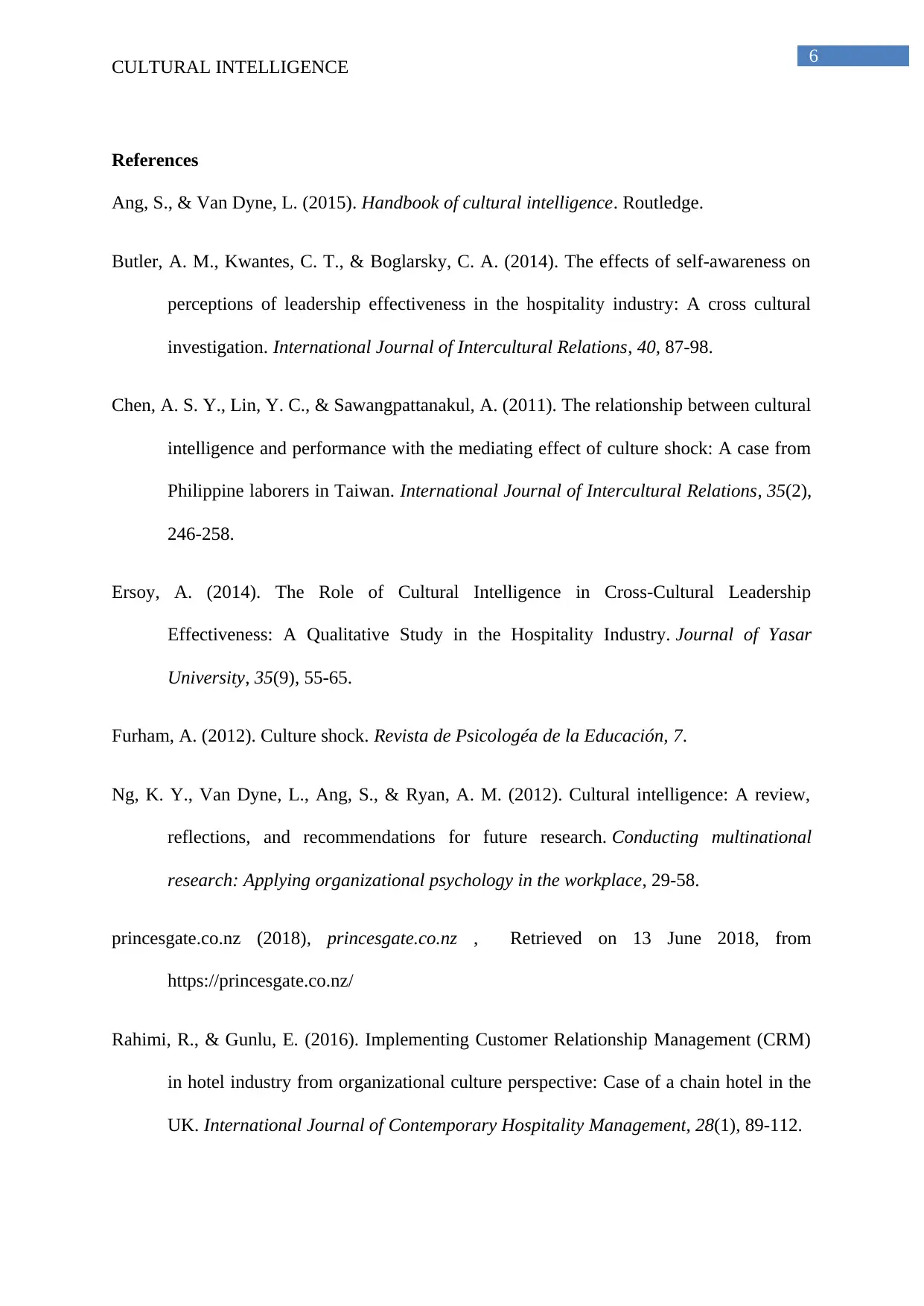
6
CULTURAL INTELLIGENCE
References
Ang, S., & Van Dyne, L. (2015). Handbook of cultural intelligence. Routledge.
Butler, A. M., Kwantes, C. T., & Boglarsky, C. A. (2014). The effects of self-awareness on
perceptions of leadership effectiveness in the hospitality industry: A cross cultural
investigation. International Journal of Intercultural Relations, 40, 87-98.
Chen, A. S. Y., Lin, Y. C., & Sawangpattanakul, A. (2011). The relationship between cultural
intelligence and performance with the mediating effect of culture shock: A case from
Philippine laborers in Taiwan. International Journal of Intercultural Relations, 35(2),
246-258.
Ersoy, A. (2014). The Role of Cultural Intelligence in Cross-Cultural Leadership
Effectiveness: A Qualitative Study in the Hospitality Industry. Journal of Yasar
University, 35(9), 55-65.
Furham, A. (2012). Culture shock. Revista de Psicologéa de la Educación, 7.
Ng, K. Y., Van Dyne, L., Ang, S., & Ryan, A. M. (2012). Cultural intelligence: A review,
reflections, and recommendations for future research. Conducting multinational
research: Applying organizational psychology in the workplace, 29-58.
princesgate.co.nz (2018), princesgate.co.nz , Retrieved on 13 June 2018, from
https://princesgate.co.nz/
Rahimi, R., & Gunlu, E. (2016). Implementing Customer Relationship Management (CRM)
in hotel industry from organizational culture perspective: Case of a chain hotel in the
UK. International Journal of Contemporary Hospitality Management, 28(1), 89-112.
CULTURAL INTELLIGENCE
References
Ang, S., & Van Dyne, L. (2015). Handbook of cultural intelligence. Routledge.
Butler, A. M., Kwantes, C. T., & Boglarsky, C. A. (2014). The effects of self-awareness on
perceptions of leadership effectiveness in the hospitality industry: A cross cultural
investigation. International Journal of Intercultural Relations, 40, 87-98.
Chen, A. S. Y., Lin, Y. C., & Sawangpattanakul, A. (2011). The relationship between cultural
intelligence and performance with the mediating effect of culture shock: A case from
Philippine laborers in Taiwan. International Journal of Intercultural Relations, 35(2),
246-258.
Ersoy, A. (2014). The Role of Cultural Intelligence in Cross-Cultural Leadership
Effectiveness: A Qualitative Study in the Hospitality Industry. Journal of Yasar
University, 35(9), 55-65.
Furham, A. (2012). Culture shock. Revista de Psicologéa de la Educación, 7.
Ng, K. Y., Van Dyne, L., Ang, S., & Ryan, A. M. (2012). Cultural intelligence: A review,
reflections, and recommendations for future research. Conducting multinational
research: Applying organizational psychology in the workplace, 29-58.
princesgate.co.nz (2018), princesgate.co.nz , Retrieved on 13 June 2018, from
https://princesgate.co.nz/
Rahimi, R., & Gunlu, E. (2016). Implementing Customer Relationship Management (CRM)
in hotel industry from organizational culture perspective: Case of a chain hotel in the
UK. International Journal of Contemporary Hospitality Management, 28(1), 89-112.
Paraphrase This Document
Need a fresh take? Get an instant paraphrase of this document with our AI Paraphraser
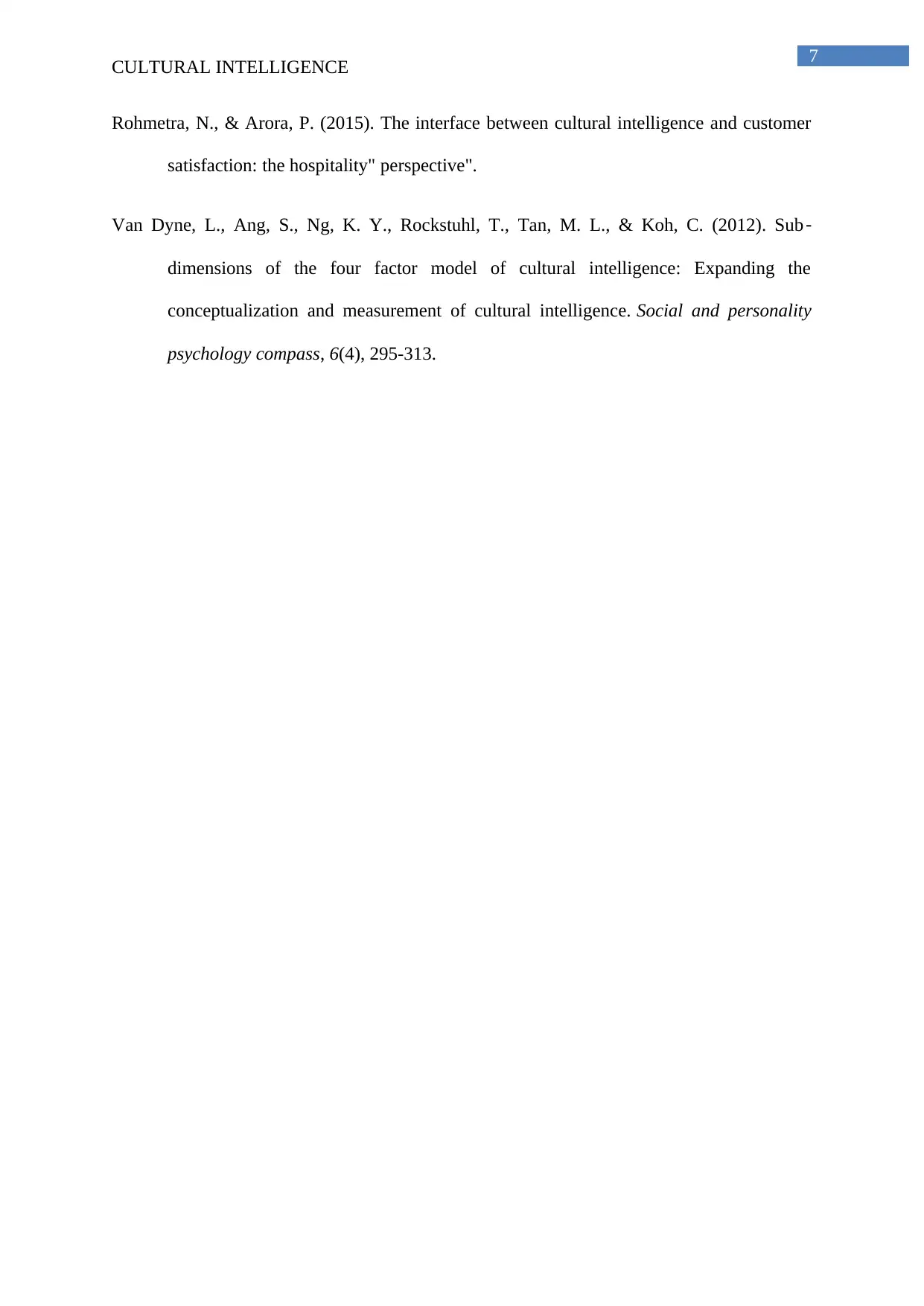
7
CULTURAL INTELLIGENCE
Rohmetra, N., & Arora, P. (2015). The interface between cultural intelligence and customer
satisfaction: the hospitality" perspective".
Van Dyne, L., Ang, S., Ng, K. Y., Rockstuhl, T., Tan, M. L., & Koh, C. (2012). Sub ‐
dimensions of the four factor model of cultural intelligence: Expanding the
conceptualization and measurement of cultural intelligence. Social and personality
psychology compass, 6(4), 295-313.
CULTURAL INTELLIGENCE
Rohmetra, N., & Arora, P. (2015). The interface between cultural intelligence and customer
satisfaction: the hospitality" perspective".
Van Dyne, L., Ang, S., Ng, K. Y., Rockstuhl, T., Tan, M. L., & Koh, C. (2012). Sub ‐
dimensions of the four factor model of cultural intelligence: Expanding the
conceptualization and measurement of cultural intelligence. Social and personality
psychology compass, 6(4), 295-313.
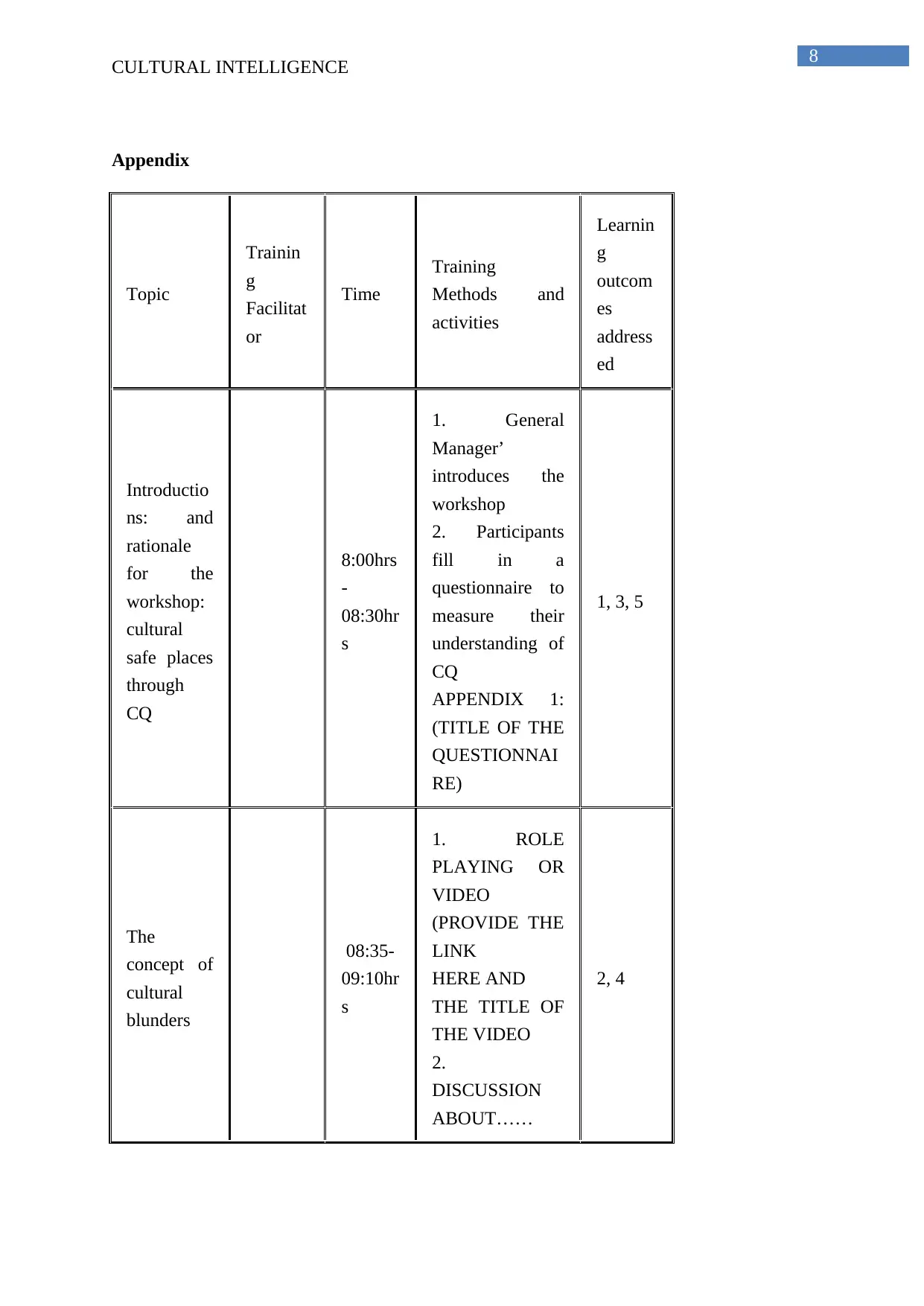
8
CULTURAL INTELLIGENCE
Appendix
Topic
Trainin
g
Facilitat
or
Time
Training
Methods and
activities
Learnin
g
outcom
es
address
ed
Introductio
ns: and
rationale
for the
workshop:
cultural
safe places
through
CQ
8:00hrs
-
08:30hr
s
1. General
Manager’
introduces the
workshop
2. Participants
fill in a
questionnaire to
measure their
understanding of
CQ
APPENDIX 1:
(TITLE OF THE
QUESTIONNAI
RE)
1, 3, 5
The
concept of
cultural
blunders
08:35-
09:10hr
s
1. ROLE
PLAYING OR
VIDEO
(PROVIDE THE
LINK
HERE AND
THE TITLE OF
THE VIDEO
2.
DISCUSSION
ABOUT……
2, 4
CULTURAL INTELLIGENCE
Appendix
Topic
Trainin
g
Facilitat
or
Time
Training
Methods and
activities
Learnin
g
outcom
es
address
ed
Introductio
ns: and
rationale
for the
workshop:
cultural
safe places
through
CQ
8:00hrs
-
08:30hr
s
1. General
Manager’
introduces the
workshop
2. Participants
fill in a
questionnaire to
measure their
understanding of
CQ
APPENDIX 1:
(TITLE OF THE
QUESTIONNAI
RE)
1, 3, 5
The
concept of
cultural
blunders
08:35-
09:10hr
s
1. ROLE
PLAYING OR
VIDEO
(PROVIDE THE
LINK
HERE AND
THE TITLE OF
THE VIDEO
2.
DISCUSSION
ABOUT……
2, 4
⊘ This is a preview!⊘
Do you want full access?
Subscribe today to unlock all pages.

Trusted by 1+ million students worldwide
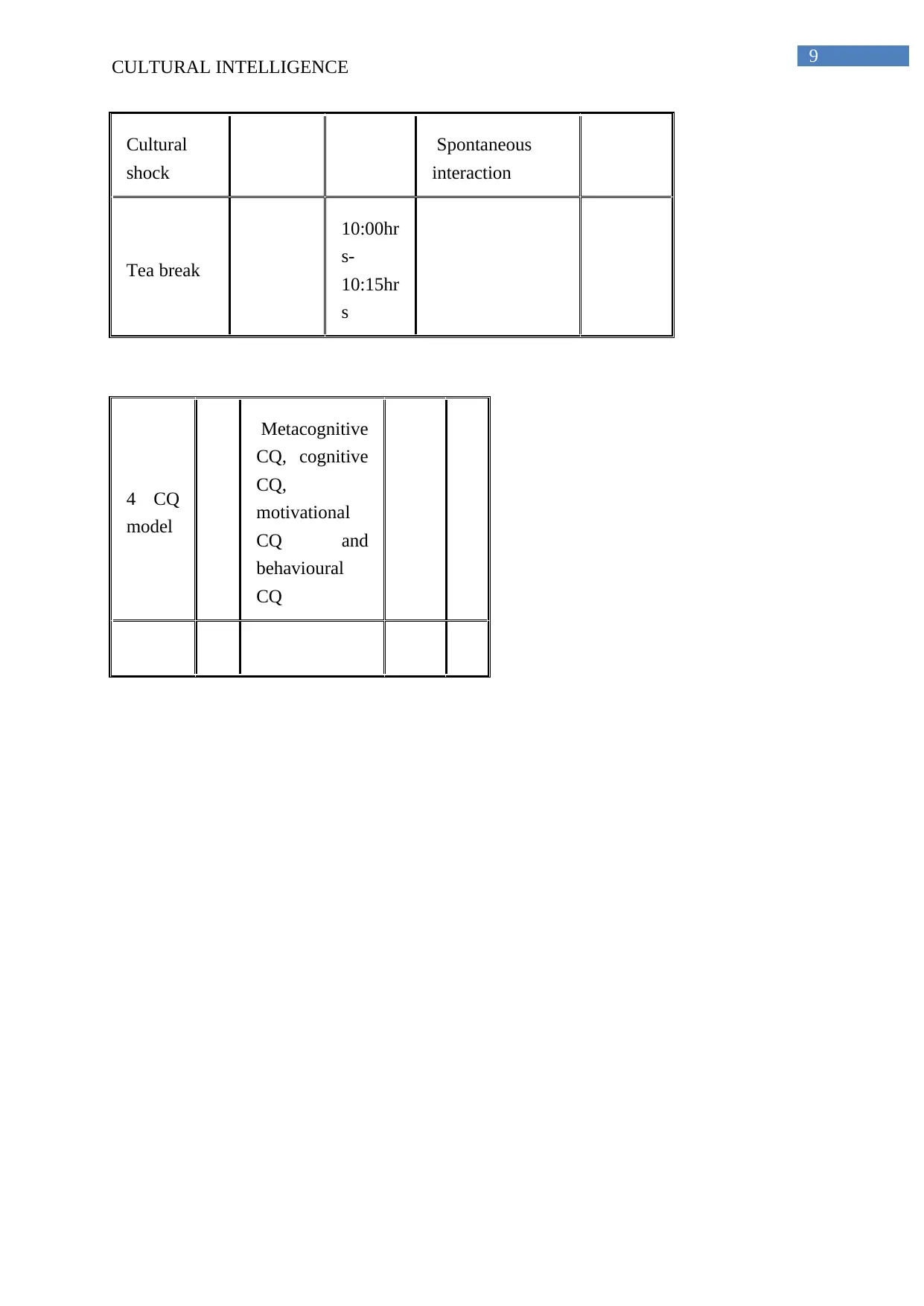
9
CULTURAL INTELLIGENCE
Cultural
shock
Spontaneous
interaction
Tea break
10:00hr
s-
10:15hr
s
4 CQ
model
Metacognitive
CQ, cognitive
CQ,
motivational
CQ and
behavioural
CQ
CULTURAL INTELLIGENCE
Cultural
shock
Spontaneous
interaction
Tea break
10:00hr
s-
10:15hr
s
4 CQ
model
Metacognitive
CQ, cognitive
CQ,
motivational
CQ and
behavioural
CQ
1 out of 10
Your All-in-One AI-Powered Toolkit for Academic Success.
+13062052269
info@desklib.com
Available 24*7 on WhatsApp / Email
![[object Object]](/_next/static/media/star-bottom.7253800d.svg)
Unlock your academic potential
Copyright © 2020–2026 A2Z Services. All Rights Reserved. Developed and managed by ZUCOL.